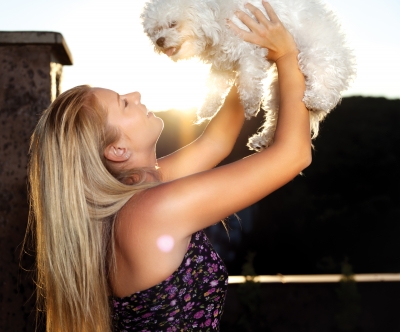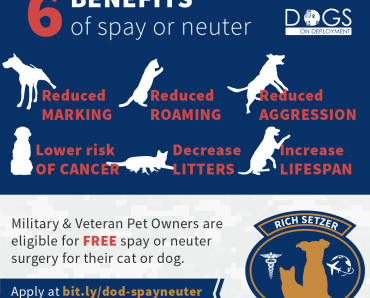Corynn Myers, one of our amazing volunteers who works on Public Affairs, knows how hard it is to suddenly face all the responsibility of managing both family and pets, when a spouse deploys. She says, “After my husband left for what was scheduled to be a 12 month deployment, my dog and two week old looked to me for all their needs. I was overwhelmed and it seemed as if everyday tasks had become impossible.”
Everyday life with a baby became complicated by caring for a pet. “My daughter would fall asleep, and after a struggle to get her to calm down, my black-lab mix would bark at the kids playing outside, then the baby would wake-up and it took every ounce of strength for me to not take my frustration out on my innocent dog. It seemed as if Max had become this high-maintenance thing that was causing more headache than happiness.”
This is not an uncommon problem, and a feeling that Dogs on Deployment hears about all the time. We often get requests from families looking to foster their pets while spouses are deployed, hoping to ease the stress. Corynn says “We got through that first month and things started to get back to normal and he became my go-to cry pillow.”
Here are 5 tips to help manage those stressful times and to start seeing your fur-baby as an asset instead of a burden during deployments. Just remember the following word and you’ll be on your way to a happy pet and a less stressed you: BRAVE – behavior, routine, affection, veterinary care, and exercise.
BEHAVIOR
Understanding your pet’s behavior is an important tool in minimizing stressful situations with your pet. Animals look to their owners for protection and leadership, and in their own way, they communicate feelings of stress. For example, some early indicators of stress for dogs include turning their head away from whatever is bothering them (another dog or person) and holding their ears back. By learning what these cues mean, you can pull your pet out of stressful situations before they escalate. Working with an animal trainer is a good way to learn how to read and react to your pet’s cues.
Some good resources for animal behavior are always ASPCA or the Humane Society.
ROUTINE
Isn’t it strange how, without looking at the clock, the dog knows that it’s about time for your service member to walk through the door? That’s his routine. So, help establish new ones. At first, it can be as simple as making sure your pet gets fed every day; he’ll come to depend on it, and you for it.
Soon, build on that. Perhaps you play fetch each afternoon, or go for a walk every morning before breakfast. Your pets will soon establish new routines with you that will be a calming presence in all of your lives. In general, our bodies and minds crave routine, and your pet is no different.
AFFECTION
Spend some time every day playing with your pet and showing your pet love and affection. Spending this quality time with your pet will help you bond more with your fur baby and help build the trust between the two of you. Plus, there’s proven benefit for you – studies have shown that petting animals lowers blood pressure!
VETERINARY AND BASIC CARE
Keep your pet healthy by staying up to date on yearly vet visits and meeting basic needs like feeding your animal the proper food, and providing water. Learn what the right amount of food and water is necessary for your pet’s breed and size. Usually, there is information for this based on your pet’s weight on the side of the food packaging, or you can consult your vet with any questions. If you change your pet’s food, be sure to slowly introduce the new food mixed in with the old food, slowly transitioning until you are only using the new food.
Taking preventative steps, such as keeping your pet up to date on shots can help keep your pet healthy and prevent unforeseen veterinary costs. Be sure to keep your pet’s flea, parasite and heartworm prevention (in endemic areas) up to date so that your pet can stay healthy and active while your significant other is deployed. Keep your vet’s information in a central place, like on your fridge, so you have it if your pet needs medical attention. Schedule annual checkups so your vet can assess your pet’s overall health and provide any shots that your pet needs.
EXERCISE
 The saying goes: a tired dog is a happy dog. Exercise is good for you and for your pets! Exercise helps you strengthen your bond with your pet and helps your pet burn off some mental and physical energy, leaving them content and better prepared to listen and behave. Exercising your pet is a great way to involve other family members, such as children. You can incorporate your pet into family time, and go to local parks or walk around your neighborhood. If you work full time or are pressed for time, consider hiring a person to walk your dog. Bad weather outside? There are plenty of indoor activities for your pet. Examples include hiding treats in your house and having your pet search for them, playing fetch with them, and taking them to dog-centered indoor activities such as doggie day care.
The saying goes: a tired dog is a happy dog. Exercise is good for you and for your pets! Exercise helps you strengthen your bond with your pet and helps your pet burn off some mental and physical energy, leaving them content and better prepared to listen and behave. Exercising your pet is a great way to involve other family members, such as children. You can incorporate your pet into family time, and go to local parks or walk around your neighborhood. If you work full time or are pressed for time, consider hiring a person to walk your dog. Bad weather outside? There are plenty of indoor activities for your pet. Examples include hiding treats in your house and having your pet search for them, playing fetch with them, and taking them to dog-centered indoor activities such as doggie day care.
When you feel overwhelmed caring for your pet while your spouse or partner is deployed, remember the motto: BRAVE – behavior, routine, affection, veterinary care, and exercise.
Your pet does not need you to be perfect; all you need to be is present and caring, and your pet will reward you with trust, unconditional love, and comfort.







